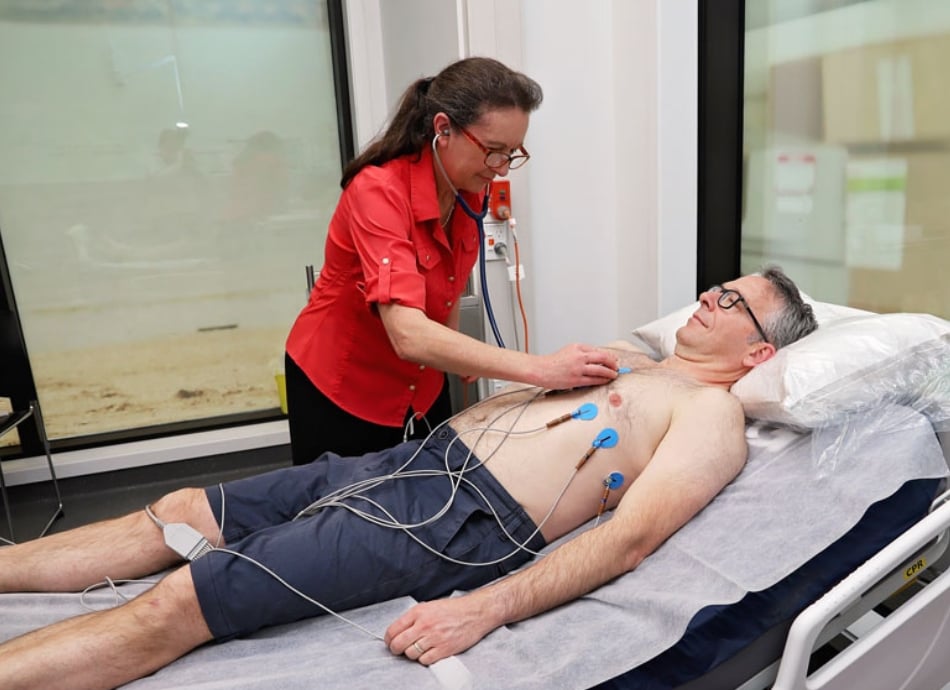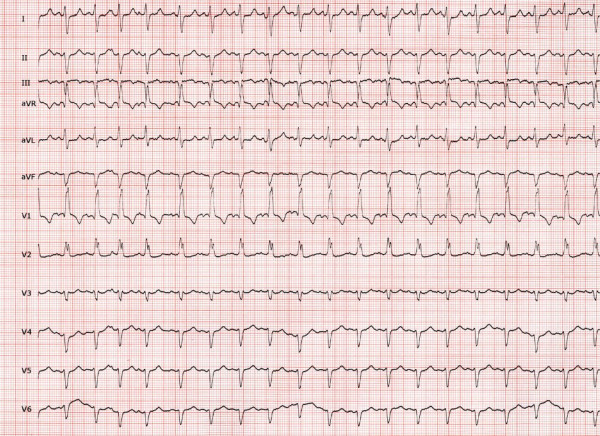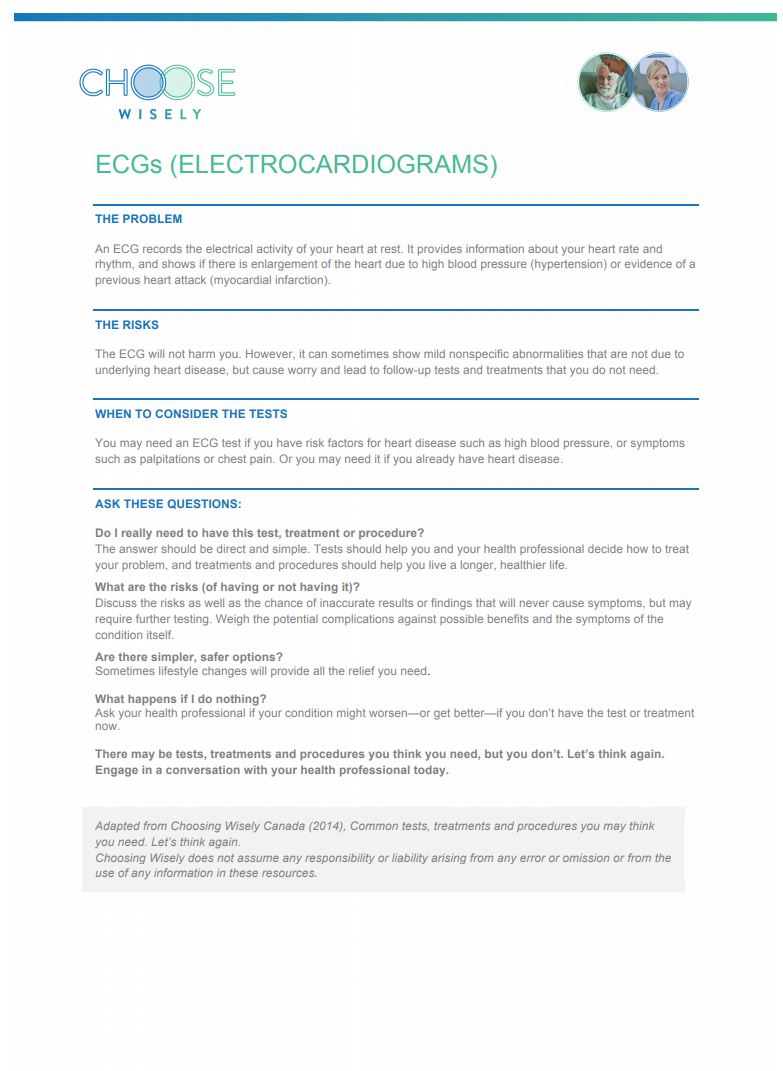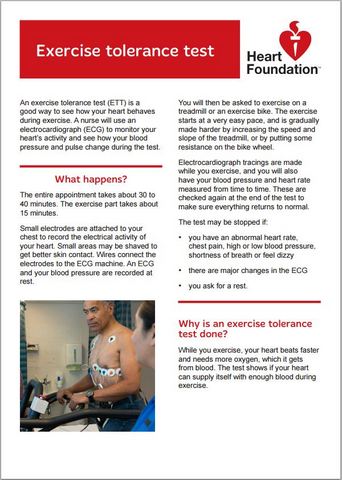Electrocardiograph (ECG)
Also called electrocardiogram
Key points about electrocardiograph (ECG)
- An ECG is the most common test for assessing heart conditions.
- It's a painless test that measures the electrical activity of your heart and only takes a few minutes to do (about 5 to 10 minutes).
- Healthcare providers are often able to do an ECG in their surgery but sometimes you will need to be referred to a hospital.
- By looking at the pattern of spikes and dips on your ECG, your healthcare provider will be able to tell how well your heart is working.

An electrocardiograph (ECG) is a test that's used to measure the electrical activity of your heart.
- This electrical activity causes contractions of your heart muscle, which results in your heart's pumping action.
- The ECG is recorded on paper, as spikes and dips called waves. By assessing the pattern of these waves, your healthcare provider can gauge the rhythm and the rate of your heartbeat.
An ECG may be done as part of a routine check-up, eg, before surgery to check how well your heart is working. An ECG may also be done:
- To check the health of your heart when you have other diseases (eg, diabetes, high blood pressure, high cholesterol) you smoke cigarettes or have a family history of early heart disease.
- To find the cause of symptoms that may indicate a problem with your heart, eg, rapid and irregular heartbeats (palpitations), and chest pain.
- To find out if the walls of your heart chambers are too thick.
- To monitor how well medicines are working and to see if they are causing side effects that affect your heart.
- To assess how well mechanical devices that are implanted in your heart are working, eg, a pacemaker to help control your heartbeat.
No special preparations are usually needed. However:
- Avoid exercising immediately before an electrocardiograph. Physical activity, such as climbing stairs, or exercise may increase your heart rate and affect the results.
- Tell your healthcare provider if you're taking any medicines for your heart. You'll be advised about whether you need to stop taking these medicines before having a heart test, and how soon you should start taking them again after the test.
- An ECG can often be done at your GP clinic, urgent care clinic, outpatients or hospital by one of the clinical team. In some situations, you may need to be referred to a hospital afterwards if it was done in the community and suggests further tests are needed.
- During the ECG test, small sticky patches, which are metal electrodes, will be attached to your arms, legs and chest. Wires connect these electrodes to the ECG machine, which detects the electrical impulses that occur at each heartbeat and records them onto paper or a computer.
- During the test, you lie quietly on a table or bed while the machine records your heart’s electrical activity. You will need to lie as still as possible, without talking, and breathe normally. This is called a resting ECG as it records the heart's activity while you are at rest, and not exerting yourself.
- After the procedure, the electrodes will be removed.
- Having an ECG is easy and pain-free. It takes about 5 to 10 minutes.
Video: How to Perform an ECG / Electrocardiogram - Clinical Skills - Dr Gill
The video below shows a young man having a ECG done in the UK. It may take a few moments to load.
(Dr James Gill, UK, 2021)
- You will usually be told the results of your ECG straight away unless it needs to be sent away to be reviewed by a specialist.
- Your healthcare team will look at the pattern of spikes and dips on your ECG. This shows the electrical activity in different parts of your heart, and how your heart is working. Ideally, this will show a consistent, even heart rhythm and a heart rate between 50 and 100 beats a minute.
- Having a faster, slower or irregular heartbeat provides clues about your heart health.
- It is important to note that a normal ECG doesn't exclude heart disease, and further testing maybe necessary.
This image shows a printout of an ECG with different lines representing different aspects of the electrical activity of a heart.

Image credit: Canva
Sometimes the ECG recording at rest (while your are lying down or resting) doesn't provide enough information and your healthcare team may request a more specialised ECG test.
Exercise ECG or exercise tolerance test (ETT)
- This records your ECG while you're exercising. It's sometimes called a "stress test" or a "treadmill test." During an exercise ECG, you may either walk on a motor-driven treadmill or pedal a stationary bicycle.
- A resting ECG is always done before an exercise ECG test, and the results of the resting ECG are compared to the results of the exercise ECG.
- Some heart problems only appear when your heart needs to work harder. This test helps to show how your heart copes under stress.
Video: British Heart Foundation – your guide to an exercise ECG (stress test), heart disease test
(British Heart Foundation, UK, 2014)
Cardiac holter monitoring test
- This type of ECG records the electrical activity of your heart while you do your usual activities. Many heart problems are noticeable only during certain activities. These include exercise, eating, sex, stress, bowel movements and even sleeping.
- A constant 24-hour recording is more likely to find abnormal heartbeats that occur during these activities. For this test, you wear a small, portable device for 24 or 48 hours and during this time your heart rate and rhythm are recorded.
Event monitoring
- This is used to record your heartbeat when you experience symptoms such as dizziness, blackouts, chest pain or palpitations. When you experience symptoms, you will need to press a button to start the recording.
The following links provide further information on electrocardiograms.
Heart tests(external link) Heart Foundation NZ
Brochures
Electrocardiograph(external link) Heart Foundation and Midland Cardiac Network, NZ
Exercise tolerance test(external link) Heart Foundation and Midland Cardiac Network, NZ
ECGs(external link) Choosing Wisely, NZ, 2016
Event monitoring(external link) Heart Foundation, NZ
References
- What to expect during an electrocardiograph(external link) Heart Foundation, NZ
- Electrocardiogram(external link) NHS, UK, 2021
Video: Electrocardiography (ECG/EKG) – basics (Osmosis for Elsevier, 2017)
Watch on Youtube(external link)
Video: How to perform an ECG/Electrocardiogram – clinical skills – Dr Gill
ECG Library Content
This ECG library is a comprehensive, free educational resource developed by Emergency Specialists (website Life in the Fast Lane) covering over 100 ECG topics. It was originally developed as a learning tool for Emergency medicine trainees and gained popularity with all disciplines from internal medicine to paramedics to assist with ECG interpretation, teaching and exam preparation.
- ECG BASICS(external link) – Waves, Intervals, Segments and Clinical Interpretation
- How to read an ECG –(external link) Geeky Medics
- ECG A to Z by diagnosis(external link) – Alphabetical diagnostic approach to the ECG
- ECG CLINICAL CASES(external link) – ECGs placed in clinical context with a challenging Q&A approach
- ECG Reference SITES and BOOKS(external link) – the best of the rest
- LITFL ECG IMAGE Database(external link) – Searchable database of LITFL ECGs
- ECG and Cardiology Eponymous Syndromes(external link) – Cheats guide to eponymous emancipation
- ECG Academy(external link) – The free videos(external link) from Dr Nick Tullo ECGAcademy.com(external link)
- The art of infarct localisation(external link)
- ECG exam template(external link) – a framework for answering ECG exam questions.
Brochures

Heart Foundation and Midland Cardiac Network, NZ

Choosing Wisely, NZ, 2016

Heart Foundation and Midland Cardiac Network, NZ
Credits: Healthify editorial team. Healthify is brought to you by Health Navigator Charitable Trust.
Reviewed by: Dr Janine Bycroft, GP, Auckland
Last reviewed:





